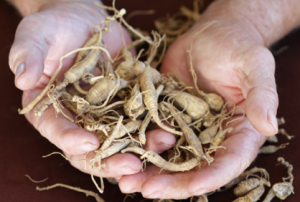In Chinese medicine the ginseng plant has been widely used. Its history in North America seems to be shorter at first glance, as it received more attention only, as Chinese medicine and acupuncture have become popular over the last decades. The Asian variety of ginseng known under its botanical name as Panax ginseng is only one of the species. There is however a variety which is native to the eastern part of the North American continent with the botanical name Panax quinquefolius. The first people using it were various Native American groups. They found it useful for childbirth and fertility. It was also used to help those with shortness of breath.
Ginseng root was considered the more valuable part of the plant, and new research has found that root extracts of the North American ginseng have an influence on the immune system. The substance enhances the production of interleukin and interferon-gamma. The immunomodulary effects which can help in the prevention of respiratory disease have also been studied in clinical trials involving older adults.
It turned out that the likelihood of developing acute respiratory illness was significantly lower in the group that was treated with a standardized formulation of 200 mg ginseng extract twice a day than in a group that did receive placebo or no treatment. It was also observed that the number of patient who had common colds was reduced in those who received ginseng. The absolute risk reduction of recurring common colds was 12.8 % and the total number of days with cold symptoms was 34.5% lower in the treatment group.
Long term studies are still outstanding, but based on the interim findings ginseng extract taken in the winter month can be beneficial especially in the older population as a weapon against respiratory illness.
More information on:
1. Preventing the flu: https://www.askdrray.com/fighting-back-against-the-flu/
2. General info on ginseng: https://www.askdrray.com/studies-show-ginseng-works/
Reference: J. Altern. Complement. Med. 2006;12:153-7.
Last edited November 3, 2014






